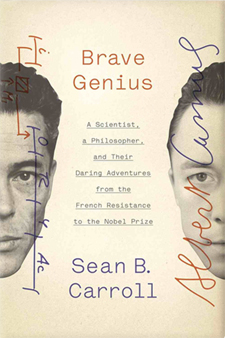The Scientist and the Philosopher
An excerpt from “Brave Genius: A Scientist, a Philosopher, and Their Daring Adventures From the French Resistance to the Nobel Prize.”
The following is an excerpt from Brave Genius: A Scientist, a Philosopher, and Their Daring Adventures from the French Resistance to the Nobel Prize, by Sean B. Carroll.
On October 16, 1957, Albert Camus was having lunch at Chez Marius in Paris’s Latin Quarter when a young man approached the table and informed him that he had won the Nobel Prize for Literature.
The new laureate-to-be could not hide his anguish.
Sure, the Algerian-born French writer had been an international figure for more than a decade. He had earned great public admiration for his moral stands as well as for his novels, plays, and essays. But not yet forty-four years old, Camus was only the second youngest writer ever to receive the Nobel. He thought that the prize should honor a complete body of work, and he hoped that his was still unfinished. He dreaded that all of the fanfare surrounding the prize would distract him from his work. The demand for interviews and photographs, and the many party invitations that followed the announcement soon confirmed his fears.
Camus also worried that the prize would inspire even greater contempt on the part of his critics. Despite his public popularity, Camus had many foes on both the political right, to whom he was a dangerous radical, and the left, among them many former close comrades who had ostracized him for his clear-eyed, damning critiques of Soviet-style Communism. Both camps took the Nobel as proof that Camus’s talent and influence had already peaked.
“One wonders whether Camus is not on the decline and if . . . the Swedish Academy was not consecrating a precocious sclerosis,” wrote one scornful commentator.
After the demand for interviews subsided, he paused to reply to a few well wishers. One handwritten letter was to an old friend in Paris:
My dear Monod.
I have put aside for a while the noise of these recent times in order to thank you from the bottom of my heart for your warm letter. The unexpected prize has left me with more doubt than certainty. At least I have friendship to help me face it. I, who feel solidarity with many men, feel friendship with only a few. You are one of these, my dear Monod, with a constancy and sincerity that I must tell you at least once. Our work, our busy lives separate us, but we are reunited again, in one same adventure. That does not prevent us to reunite, from time to time, at least for a drink of friendship! See you soon and fraternally yours.
Albert Camus

Camus knew well many of the literary and artistic luminaries of his time, such as Jean-Paul Sartre, George Orwell, André Malraux, and Pablo Picasso. But the recipient of Camus’s heartfelt letter was not an artist. This one of his few constant and sincere friends was Jacques Monod, a biologist. And unlike so many other of Camus’s associates, he was not famous, at least not yet. However, despite his pantheon of numerous, more illustrious colleagues, Camus claimed, “I have known only one true genius: Jacques Monod.”
Eight years after Camus, that genius would make his own trip to Stockholm to receive the Nobel Prize in Physiology or Medicine, along with his close colleagues François Jacob and André Lwoff.
Each of the four men’s respective prizes recognized exceptional creativity, but they also marked triumphs over great odds. The adventure to which Camus referred in his letter began many years earlier, in a very dark and dangerous time. So dangerous, in fact, that the chances each of these men would have even lived to see those latter days, let alone to ascend to such heights, were remote.
This is the story of that adventure. It is a story of the transformation of ordinary lives into exceptional lives by extraordinary events—of courage in the face of overwhelming adversity, the flowering of creative genius, deep friendship, and of profound concern for and insight into the human condition.
Excerpted from Brave Genius: A Scientist, a Philosopher, and Their Daring Adventures from the French Resistance to the Nobel Prize, by Sean B. Carroll. Copyright © 2013 by Sean B. Carroll. Published by Crown Publishers, an imprint of the Crown Publishing Group, a division of Random House LLC, a Penguin Random House Company.
Sean B. Carroll is the author of The Serengeti Rules: The Quest to Discover How Life Works And Why It Matters (Princeton University Press, 2016). He’s also the vice president of science education at the Howard Hughes Medical Institute and professor of molecular biology and genetics at the University of Wisconsin, Madison in Madison, Wisconsin.